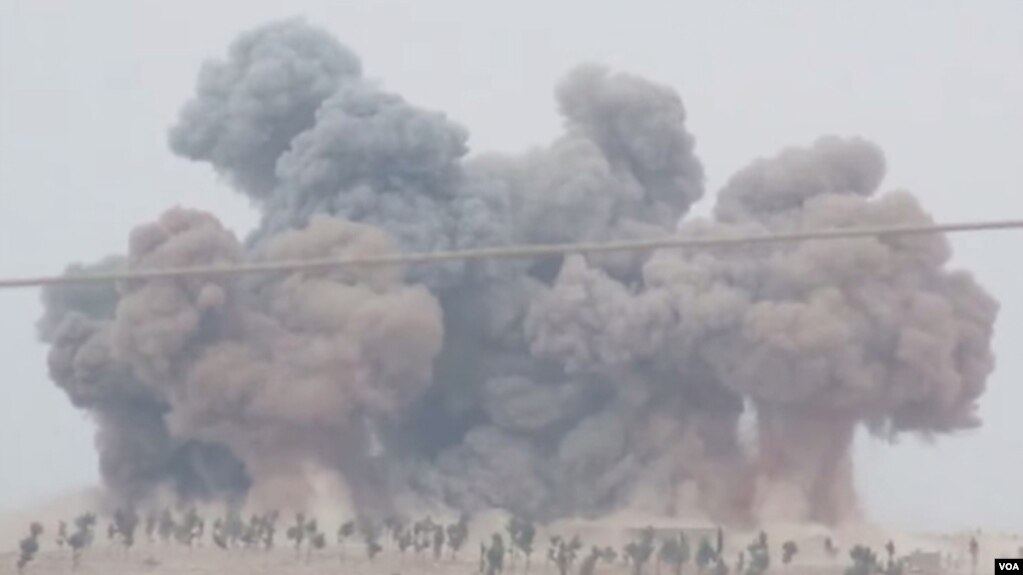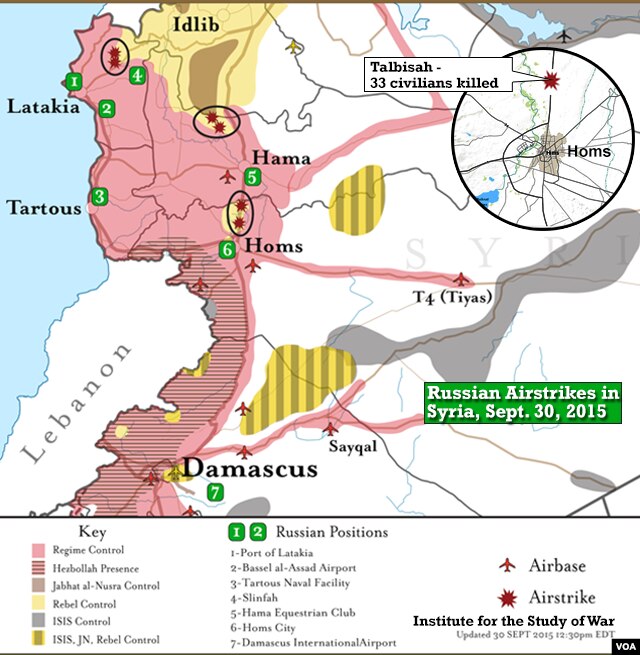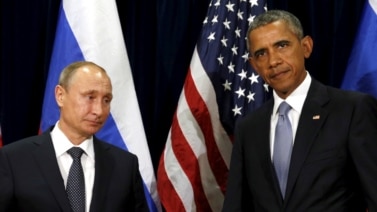
Russian warplanes attacked Syrian cities this week but the U.S. disputes whether those targets were the right ones.
Russia says the strikes targeted Islamic State fighters in those cities. But American military officials and Syrian human-rights groups say the cities are controlled by moderates who oppose the government of President Bashar al-Assad.
They claim the attacks killed at least 36 civilians near the cities, including children.

Najib Ghadbian is the special representative to the United States and the United Nations for the Syrian National Coalition. He told reporters at the UN this week that “the Russian claim that they are there to fight ISIS is…baseless.”
Khaled Khodja, the head of the Syrian National Coalition, said the bombed areas were not controlled by terrorists. The Coalition urged the UN and world powers to stop what it called the Russian “aggression.”
U.S. Secretary of Defense Ash Carter called the Russian airstrikes “ill-advised.” He noted that the strikes took place where “the IS group is not present.”
“This is not the kind of behavior that we should expect professionally from the Russian military.”
Russia says the strikes hit Islamic State military equipment, command areas and vehicles.
Russian President Vladimir Putin said the strikes were requested by President Assad. He said they will continue as long as the Syrian army is fighting terrorists.
The U.S. and Russia disagreed about how to deal with the civil war in Syria before the airstrikes began. The U.S. and many other countries believe the conflict will not end so long as Mr. Assad is in power. Russia believes he should be permitted to remain the leader of the country.
David Lesch is an expert on Syria at Trinity University in Texas. He told VOA that Russia may be using the airstrikes to force opposition groups to negotiate. He says the air strikes may make Mr. Assad stronger and eliminate his need to negotiate.
Obama administration spokesman Josh Earnest says “Russia will not succeed in imposing a military solution on Syria any more than the United States was successful in imposing a military solution on Iraq a decade ago, and certainly no more than Russia was able to impose a military solution on Afghanistan three decades ago.”
Republicans in Congress say the Obama administration’s Syria policy is weak. They say that is the reason Russia has taken such strong action. Senator John McCain says the administration’s diplomatic and military efforts have failed.
“This administration has confused our friends, encouraged our enemies, mistaken an excess of caution for prudence and replaced the risks of action with the perils of inaction. Into the wreckage, into the wreckage of this administration’s Middle East policy, has now stepped Vladimir Putin.”
Some experts say Russia should be permitted to enter the conflict. They say Russia will fail, and become a weaker world power.
Russia moved aircraft and other military equipment into Syria for weeks before its warplanes bombed Homs and Hama. Some experts said that signaled that Russia supports President Assad.
Experts say the airstrikes may push neighboring countries like Turkey or Saudi Arabia to take force against Russian attempts to strengthen President Assad.
Chris Kozak studies Syria at the Institute for the Study of War.
“You may see these countries step up their own efforts on behalf of their preferred players in Syria in order to counteract what the Russians are doing.”
Officials say warplanes from the US and other countries will continue to attack Islamic State militants in both Iraq and Syria.
This week, U.S. Secretary of State John Kerry and Russian Foreign Minister Sergei Lavrov met to talk about ways to end the conflict in Syria. Mr. Lavrov said “we all want Syria democratic, united and secular. But we have some differences on the details on how to get there.”
U.S. and Russian representatives have also said they want to talk about ways they can keep their militaries from clashing with each other in Syria.
I’m Christopher Jones-Cruise.
This report was based on information from VOANews.com. Christopher Jones-Cruise adapted it for Learning English. Kathleen Struck was the editor.
Words in The News
eliminate – v. to remove (something that is not wanted or needed); to get rid of (something)
decade – n. a period of ten years
prudence – n. careful good judgment that allows someone to avoid danger or risks
perils – n. something that is likely to cause injury, pain, harm or loss
prefer – v. to like (someone or something) better than someone or something else
counteract – v. act against (something); to cause (something) to have less of an effect or to have no effect at all
secular – adj. not religious

